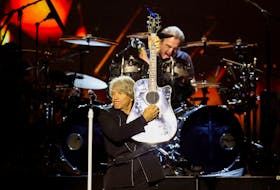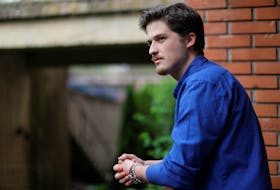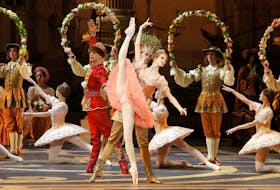Cédric Delavaud makes beautiful music, but he wouldn’t call himself a musician.
“I’ve never went on the stage before. I’ve never sung before. I’ll be honest. Never,” said Delavaud.
That was true until June, when he had his performance debut at the Mosaic Multicultural Festival Fransaskois pavilion in Regina.
Delavaud and his barrel organ were also part of the Canada Day festivities in Wascana Centre, and will be in Harbour Landing this Sunday as part of the Summer Bash community event.
To call it an instrument is not entirely accurate. It’s more like the precursor to the phonograph.
“It’s called mechanical music, because it’s not the player who’s playing it. Like, I’m just turning the crank,” said Delavaud.
Delavaud’s barrel organ — also known as a crank organ or street organ — is a wooden box with a crank on one side.
Inside the box, there are accordion-style bellows, which contract and expand with air to amplify sound. There are also keys or pipes corresponding to musical notes. The music is contained in a strip of perforated cardboard, which moves through the contraption when the crank is turned.
The barrel organ made music accessible for many people in France in the 17th to 19th centuries, said Delavaud.
“Before that instrument was invented, all the best music — so we’re talking about Mozart, Beethoven, all those guys — that was only played in theatres in Paris for the elite. And only the richest guy had access to that music,” said Delavaud.
The players of this music, most often, were beggars that rented the organs from manufacturers. They busked for change, then returned the instruments at the end of the day, said Delavaud.
“That was mostly foreigners,” he added, which is how the instrument got its French name — “l’orgue de barbarie.”
“It has nothing to do with barbarians … In the 17th century, we called barbary everything that was not French,” said Delavaud. “And because that instrument was played by foreigners, that were not speaking a very good French, they call that instrument after them.”
Delavaud grew up in Challans, France; wanting a change of scenery, he and his wife moved to Canada after finding work in Regina several years ago.
On a trip home last summer, Delavaud finally obtained his own organ — something he’d wanted since seeing a YouTube video of his favourite group, Les Ogres de Barback, playing one.
“It was not easy” to bring it back to Canada, said Delavaud. “We had to make it fit in our luggage.”
He found the instrument for sale on Facebook, secondhand from a woman in Thiviers — a four-hour drive from Challans. She’d ordered it 15 years ago from Orgues Odin, one of a handful of manufacturers making new organs in France.
At the height of the organ’s popularity, Delavaud said, there were more than 100 companies making the instruments.
The manufacturer’s wife painted the custom design on the outside of the wooden box, which is a “very small (organ) with just 27 different notes” — others have 29 or 32 notes.
Much of the music for the organ, Delavaud also finds secondhand, although there are companies that make new songs by punching holes into cardboard. For the most part, they are “very famous” songs, which would get people singing in the street in France.
In Canada, Delavaud has been singing the songs himself.
“I’m probably not the greatest singer in the world. But, you know, as long as I can share what I love with people, and if they like it, that’s all I (want).”
It’s a challenge to sing in time to the music, he added: The quicker you turn the crank, the faster the music’s tempo.
The organs are still common enough in France, although “it’s getting rare” and difficult to find an older instrument in good shape.
“And I never heard about an instrument like this in North America … I don’t think it came here. I heard people saying that they saw some players in Quebec,” said Delavaud.
The instrument is an extension of Delavaud’s long interest in old technology and games.
He is rekindling his childhood love of woodworking, while re-creating traditional games out of wood — which he also displayed at Mosaic and Canada Day festivities.
“Every time I go somewhere with my games, how many parents tell me, ‘My kid is on his cellphone all day long. And you show up with just wooden games like this and he’s playing all day long,’” said Delavaud. They both encourage “go(ing) back to basics.”
Copyright Postmedia Network Inc., 2019








